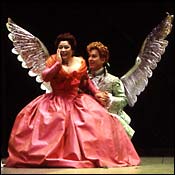
Handel had plenty of flops in his day, but contemporary audiences may wonder why as his operas re-enter the repertory one by one and to general delight. The latest revival hereabouts is Flavio, in a new production at the New York City Opera, and an enchanting discovery it is. Audiences didn’t seem to think so when the opera was first presented at London’s Haymarket Theater in 1723, where it ran for a mere eight performances despite a cast featuring seven of the most spectacular singers of the age. Apparently the problem was one of genre perception, since the work deftly mixes comedy and tragedy as only Handel could, a sly comment on how absurdly human beings can behave when in love or endowed with a bit of ambition and power.
The score also pokes gentle fun at opera seria conventions, especially in the magical ways the opera’s buffo couple mirrors the actions and musical manners of the more serious lovebirds, creating a drama of amorous ambiguity that clearly indicates the short distance between comedy and tragedy. As City Opera dramaturg Cori Ellison suggests, Flavio’s delicious ambivalences call to mind those in Mozart’s Così Fan Tutte, another opera that makes us laugh and cry, and that was long misunderstood for precisely that reason. This production of Flavio nicely catches the duality of the piece, both through the bright candy-box colors of David Zinn’s sets and costumes and Chas Rader-Shieber’s antic direction, full of witty comic invention but never forgetting that Handel’s characters, even when they obey the rules of Baroque opera, are always flesh and blood.
Another reason why these operas are currently so popular is that the voices to do the music justice are plentiful once again. Countertenors, once an exotic species, now come in all forms, and here are two of the best: David Walker, dazzlingly mercurial as King Flavio, and Bejun Mehta, a banked fire of smoldering intensity as the desperately conflicted Guido. Their vocal brilliance, along with Jennifer Aylmer’s glittering soprano as the sorely beset Emilia, contrast nicely with the lower-voiced drolleries of Mika Shigematsu and Maria Zifchak as the comic couple, while Keith Jameson and Jan Opalach make the most of the plot’s dueling fathers. Under George Manahan’s direction, the orchestra gives a sparkling account of the score, further proof that Handel is no longer specialist territory but an integral part of everyday operatic life.
The Berlioz bicentennial celebrations continue, and, happily for us, conductor Colin Davis is still around to lead the revels. Most recently, he could be found at the head of the New York Philharmonic in Avery Fisher Hall, presiding over a concert of the composer’s last major score, Béatrice et Bénédict, a needle-sharp opera based on Shakespeare’s Much Ado About Nothing. Lucky New York. Anyone who fell in love with this dazzling piece at the Philharmonic can now see a fully staged production this week at the Manhattan School of Music.
For the Philharmonic’s concert version, the dialogue was spoken by a separate cast of actors (Harriet Harris, David Hyde Pierce, and Philip Bosco, among others). It worked well enough, although the arrangement gave a curious sense of two different performances going on at once. The opera’s the thing, though, here conducted by Davis with the skill of a master lapidarian and handsomely sung by Susanne Mentzer (Béatrice), Gordon Gietz (Bénédict), Susan Gritton (Héro), and Nancy Maultsby (Ursule), the latter two voices blending exquisitely in that heart-stopping Nocturne that ends Act One.
Classical Music Listings
• Highlights
• Classical Music
• Opera
• Dance
• All Listings
Flavio
Opera by Handel. New York City Opera, conducted by George Manahan.
Béatrice et Bénédict
Concert of the opera by Berlioz. New York Philharmonic, conducted
by Colin Davis at Avery Fisher Hall.